
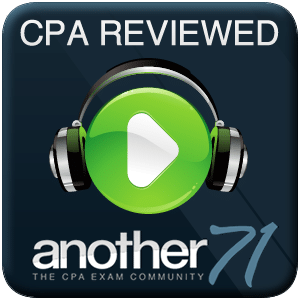
What is CPA Exam (and How Many CPA Exam Parts?) | Another71 Podcast #1
It runs approx. 30 minutes. I cover 10 or so questions from readers…study tips, motivation, etc. It's version 1.0 … I welcome your feedback 🙂
Podcast: Play in new window | Download
Subscribe: Apple Podcasts | RSS
Welcome to the CPA Review this podcast of another71 and it's official because it's the first and it's the one and only, right? So I get a lot of emails. I would say I get hundreds of emails a month from people who. Are you looking for help? Who knows that I used to be in the same situation. So they're looking for insight on studying exam scheduling, how to, how to pick a review course, you name it.
So I thought it was time to start a podcast because that's pretty much what you do, right? He started a podcast. So anyway. So today is Wednesday, September 7th, and I hope everyone had a great labor day weekend. you know, normally for a holiday, you were supposed to take it easy maybe. But, labor day weekend was just that I was manual labor, on Saturday.
I actually had. I had a good day. You know, as a parent, you maybe do things with your younger children that you wouldn't have done with your older children when you were a new parent, for instance. I have five kids and, and they were all with my wife, by the way, and I'm not, not Catholic, not Mormon. So I get asked those questions.
and so as a new parent, I would not have taken a three and a half month old to a college football game, but you know what, baby number five. It was time to go. So we took my eight-year-old, six years old and my three and a half year old and packed up for the promised land, which is Manhattan, Kansas, in case you didn't know for K state football game.
My wife and I have a book, K state alarms. And I used to go to almost all of the games and once parenting hit, I maybe make it to two a year. So. That was a new experience taking a three and a half-month-old to a football game. It kind of puts a new spin on, on tailgating, you know, when you have to haul around the diaper bag.
So, and, you know, then, Sunday I spent a good five hours, trimming around my mother-in-law's property and, and then Monday, labor day, I. Renting a power washer, which I've never done, and I power washed my deck, which as it turns out, was long overdue. So basically, let's, let's get started. I get, I get a lot of questions and I know some of you have very similar questions.
First question is from Kim. Jeff, this is, this was my third time to sit for my exam this year. And unfortunately, I felt the same about the simulations as I did before. I used my time more efficiently though, and I'm hoping that maybe I managed to get a 75 this time. I know this feeling of uncertainty is very common, but would you recommend that I move on to the next section, which is fir financial.
Kim didn't mention what CPA Exam she took. But you know when you sit for an exam and whether or not you feel good or bad, that exam is done and while you're waiting for your score, you could spend the next, well, sometimes you spend the next like eight weeks waiting for a score depending on when you take it in the window.
But you can spend that time anxiously second-guessing yourself or you can decide, okay, that exam is done. I'm going to focus on the next exam. And let's say you have to wait three weeks for your score and it comes back that you failed. I mean, What is CPA Exam life without a little failure. Well, you can decide then if you want to jump back in and take that exam again and put your current study, not halt, which in this case would be financial accounting and reporting, but.
You know, at that point, you know, let's say, let's say that you score a 74, let's say that's regulation and you score 74. Well, today you're not one point away from passing regulation. You are back to, you know, if you sat down and took it today without standing again, you might score a 60. So either way, you're probably going to have to go back to the beginning so that you don't cut any corners.
Because if you do cut a corner. It's very likely that it could cost you on exam day. So if you were three weeks into financial and you plan on studying eight weeks for financial, I would go ahead and study the additional five weeks, knock out financial, and then go back to, let's say whatever it is, regulation, if you need to, I would not stop and restudy an exam section that you already took.
Mandy says, Jeff, I've taken all of the exams, passed BEC regulation and financial, but I, I found out that I failed auditing for the fourth time and I lost credit for regulation. I was wondering what advice you would give to someone in my position. What Mandy, I was once in your shoes and I failed.
Regulation and I scored my second 74 in a row and had I scored that 75 or one quote point away, I would have been a CPA. But instead after my second 74 not only did I not pass regulation, I lost my financial credit. And in my opinion, there's one section of the CPA exam that you don't want to lose your credit for.
It's financial. So. I was extremely frustrated about my second 74 in a row and I was extremely frustrated about losing financial. As a matter of fact, when I first passed financial, I, felt like I had passed the CPA exam itself. I pretty much took a year off the study and just like. I'm celebrating, celebrating my moral victory.
And, so yeah, it was, it was hard. I, I wanted to throw my laptop through my wall. I was so mad. But you know what? You can, you are allowed to, Seoul can feel sorry for yourself for a couple of days, but then. But then you have to say, you know what, I'm not going to let the AI CPA beat me. And if I decided to call it a day now, it will haunt me for the rest of my life, both professionally and personally.
Because there's definitely a, I mean, passing the goal of passing the CPA exam is not just a professional goal. I mean, it's, if it was just a professional goal, you know, people wouldn't cry when they, when they. Found out that they both passed and failed. You know, those are the professional goal. People wouldn't get divorced or leave their spouse over the CPA exam studying, which does happen.
I, I've spoken to several of those people on the phone, actually. It's pretty crazy that the CPA exam can cause marital discord. so what do you do? Okay. You have to. Look at your study preparation, are you giving 110% effort or are you giving 60% effort? Is your review course the right course for you?
Does it match your learning style? And then you just have to pretend like you're studying for the first time. You know, you'd get up early, you study at lunch, you study late, and you just focus on that one exam. In this case, it would be. Like if you study for regulation again and then you just have to look at financial, you know, I guess, yeah, you lost your, your regulation credit because you failed auditing.
you have to look at tackling auditing again like it's an opportunity. Like it is the road that will take you to become a CPA and you have to, you have to look at it that way. You have to look at it as an opportunity. Not everyone is as fortunate. As you to be in the position to take the uniform CPA examination.
There's a lot of bookkeepers and accountants out there who don't have the hours, who didn't, didn't go back and take night school. So they get the requisite 150 hours and they can't take the CPA exam. And while taking the CPA exam is terrible, it's rough, it's expensive, it truly is a unique opportunity.
And if you look at it as an opportunity. Instead of just a roadblock in your life, I think you will find more success. Benjamin writes, Jeff, I received a failing score of 73 on financial. If I would've passed, I would have been finished. But with this failing score, I've lost my regulation. Credit sounds like a common thing.
Do you think with all your experience in dealing with the exam and the people who struggle with it, that it is worth it to appeal the score? Excellent question. I've gotten emails from people who scored like a 71 and want to know if they should appeal the score and my answer. Okay. After I scored my second 74 on regulation and thus lost my financial credit, I said, you know what?
This isn't right. I said, there's no way that I scored back to back 70 fours on regulation. There's just no way. but as it turns out, you know what I did? and I just had to own it. I looked into appealing. And the way that it works is that once you appeal your score, it takes like eight weeks for them to look at it and then get back with you.
And even then, the chances of them changing your score is like next to next to none. So in those eight weeks, you could have it. Plus it's expensive. It costs about the same amount as a new notice to schedule. So you could appeal the score, pay the money, wait eight weeks, and then they come back and they say, no, we were right.
Or. You can buy a new notice to schedule, study hard, go in there, pass the exam, and then get your score back before you ever would have even received your, your failing score appeal. So I would never appeal a score ever. Charlotte asks, are two exams in a testing window doable. Specifically, financial accounting and reporting and auditing, and the answer is yes, it's doable.
Okay, let's go back to the July and August testing window, and this is how it would have worked if you wanted to take financial and auditing in the same testing window. So June hits, which is a blackout month, AKA score release month. at least under, at least it was back in June 2011. They're going to change how they release scores.
But, June is a blackout month, so there's, so you cannot sit, so you finish up your may exam, June hits in June, you start studying for financial accounting and reporting. Now. Yeah. Okay. Yeah. We'll say financial accounting and reporting, and you decide that you are going to study 25 hours a week for six weeks.
So that's doing a little spidey math. That's 150 hours, right? Which is a lot? I recommend about 130, so, so you shoot for 20 to 25 hours a week for six weeks. So. All of June. And then let's be realistic. You know, you take two or three days off for the 4th of July, holiday with probably brings you back down to your hundred and 30 and you take financial and accounting and reporting on July 15th you take a day to recoup cause it was terrible.
I mean, it's just a monster exam. You start studying for auditing on July 17th. And you studied for another six weeks, give or take, and you take auditing on August 31st by the way, if you ever want to schedule an exam at the end of the month or at the end of the testing cycle, like August 31st would have been, you always want to schedule, schedule it early because everyone who will procrastinate just like you did, so if you want to take.
Two, two exams in a testing window, perfectly fine. You can space it out. Just as I explained. One thing that I would not do unless you absolutely have to, and then you're still probably looking at a really tough go of it. I would not study for two exams at once, so you study for a full. You studied for a full, like eight weeks of financial accounting and reporting and auditing at the same time and take both exams on the same day.
I wouldn't do that. They, they give you this, this testing system for a reason, so you might as well take advantage of it. This isn't the old paper and pencil day. so. If you want to take two sections in a testing window, that's the way that you do it. Very doable. Meredith writes, Hey, Jeff, I'm embarrassed that so many of my coworkers who are much younger than me and right out of college have already passed and I haven't.
I'm losing faith in myself and doubting that I can achieve this after seeing so many failing scores. It's hard for me to believe that this is possible. Can you please offer any tips, suggestions, or advice? I feel like I'm at a breaking point and need some encouragement. Well, Meredith, you are the average CPA exam candidate.
The average candidate fails. you know, the passing rate for any given section for the CPA exam is around. 45 to 50% give or take. So now it's not uncommon for me to get emails from people who are in their forties or fifties who, who I think are extremely brave because the easy thing to do when you're later on in your career is to not tackle something so intimidating as a CPA exam.
But yeah, people in their fifties who want to. Just take on this horrific exam and it's just something that they want to do. And I, and I applaud them for it, but the average candidate struggles, and so they, they couple the fact that they're older and a nontraditional candidate, plus the fact that the exam is just a bear.
And it's very discouraging. So Meredith, what you do is. Number one, you have to have the right CPA review course that matches your learning style. If you learn by PowerPoint with voiceover watch demos out there, you get a course with PowerPoint and voiceover. If you need a live instructor writing stuff out on a dry erase board, there are courses out there.
Watch their demos. You need to have a course that matches your learning style. which is something that I think most people do not do. They just buy a course per their peer's recommendation or maybe either, maybe they work for a CPA firm and their CPA firm just gives it to them for free, which might be a good thing.
but if it means that you have to struggle with the exam and spend thousands of dollars on new notice of schedule because it's not working for you, then that's not necessarily a good thing. But at the end of the day, you have to have a good review course. You have to have a stringent and consistent study schedule.
And then you also have to have like, course, this is, you know, healthy life balance. And CPA exam is a, is an oxymoronic, phrase. For lack of a better word. yeah. They just don't, they just don't go together. So, but you have to at least have some semblance of a life outside of the CPA exam, or you will just die.
you know, you have to keep exercising. You have to designate one night, a week as a date night with your significant other. If that applies, you know, one night a week with your kids. If that applies, you have to stay active in church. If you. Our act or if you were active in church, this stuff is just important because, and you have to, you have to live on something other than caffeine.
So just keep, keep looking forward, keep pushing forward, and just know that you're not alone. And, and that at the end of the day, this, the CPA exam, passing the CPA exam will be an accomplishment. That no one can ever take away from you. Ashley says, Jeff, I worked full time as a fund accountant and I usually end up staying late.
I've been trying to do two to three hours each night along with five to eight hours on the weekend. I take off two days before my exams to do some last-minute cramming, but at this point, I don't know what to do anymore. What do you recommend to do just a week out from your exam? Excellent question. A week out from your exam.
Hopefully, you have taken excellent study notes, and not only did you take those notes, but you rewrote them because it's one thing to take notes while you watch a review course, but if you don't take the time to rewrite your notes, it's almost pointless to take the notes you might have. You might as well be highlighting because when you rewrite your scribbles on your, on your legal pad, and then, and then you put them in a more condensed.
Form on like a piece of graph paper or maybe another legal pad, and you and you take this long hand and put it into little fact nuggets, that's when it really pays off for you. So hopefully you've rewritten your notes. Now, if you have a cram style course like you watched your big boy course, and then they have a condensed version of their big boy course, maybe they call it a cram or whatever they call it.
I would start watching that maybe, maybe seven to eight days out. So seven, eight, nine days out from your exam. Take two to three days to do that. Some of those things are like 20 hours long, so you need to budget accordingly, but a week out from your exam. And if you have notes, you want to carry those things everywhere you go.
If you go to the doctor's office, wherever you go, you have on the nightstand before you go to bed at night and you're reading them, you're constantly reading them and absorbing that information. Okay? You know what your weakest topics are. On on the exam, what topics you just pray that you don't see very many questions on.
So if it's financial, maybe you're scared to death of not-for-profit accounting. Maybe you hate bonds, maybe you hate pensions. Well, so you order the sections that you hate from, hate to like, so. So you start out knocking out. 20 question mini testlets of not for profit accounting and then you go to, and then, and then you keep doing 20 question testlets over not for profit accounting until you're scoring in the 70 80 percent range.
And so at first, if you're terrible at it, maybe you're, you know, on your, on your, on your software, maybe you're just clicking the answers and reading them cause you're so bad and you're so weak at it, you're just trying to, to gleam this information because you are not trying to be an expert enough private accounting.
You're trying to understand not for profit accounting enough to where you can score points on exam day. So. So you worked at 20 question testlets until you score a 70 80% then you move on to your next worst sections of bonds, whatever, pensions, whatever. And you just do that and you just keep reviewing, keep reviewing, keep reading your notes.
And even when you drive to the exam center, maybe if you have to, you know, they tell you to arrive, what, 45 minutes early or something like that. Man. I didn't walk into my exam center until 10 minutes before I had my exam. Now, I do not recommend doing that. That is not a best practice, but that's what I did.
I S I sat out there in my car and literally crammed with my notes leading up to my exam. So like there was one section that was just. That I just knew that I wasn't going to do well on, and in my case, it was not for profit County, so I was just, I was just knocking out not for profit accounting in my car.
Literally leading up to my exam, I walked in. I had enough information there passed, so hopefully, that's helpful. All right. Turning to the another71.com Facebook page, which is. Facebook.com/another 71 you can join what, seven thousand eight thousand people that are on there. Lindsay says I need advice. I just started studying for auditing my first ever attempt at a CPA section, and I'm so confused.
I'm using Kaplan. I have books flashcards. Study class, et cetera. I don't know what to focus on or how to incorporate all of these different resources. I don't want to waste timeshare. Should I read every chapter in the study book or is it better to watch the classes, take notes, and focus on the multiple-choice questions and the simulations?
I guess every person is different, but I want to set myself up for success if possible. All right. She has 65 days, give or take. Okay. Excellent. Question. Lindsay. Basically my, my strategy for studying can apply to any review course. It doesn't matter what you take, I'm assuming that your review course involves video lectures and I developed what is now called the Ninja framework and I am J that and so you can follow this to a T and it works it people use it.
I used it. This thing works. Okay, this is what you do. Ninja N stands for nail the videos. The first thing you do is you watch all of your videos and you don't work any assigned multiple choice questions until you've completed all of the videos. Why do you do that? Well. Let's say that you watch video one and then you do, and then you do the homework for video one and let's say you're in week six.
are you going to remember the homework questions that you did in week one as you lead up to your exam? No. You are going to have to redo those homework questions. So why are we doing them twice? And so what you do, you watch all of the videos because now there's also a moldable motivational component to this because let's say you have like, man, you have like 50 hours of financial videos to get through or whatever it is.
if you do video, homework, video, homework, video, homework, that will take forever, and pretty soon you're like, man. You know you're stuck on week three and you're behind because you're just so sick of watching the videos. It doesn't feel like you're making any traction. So what you do is you blow through those videos as quickly as possible.
And the I, and Ninja and I, the I stands for intense notes. So you're watching the videos as you're, as you are watching the videos, you're taking intense notes. If the instructor says it. And it, and if it's a key point, you write it down. You just keep, you just write furiously. And an added benefit of that is CPA exam videos can tend to be very boring.
And so writing keeps you actively engaged. You're not thinking about your emails, you're not thinking about Facebook or whatever it is. You're not thinking about whatever is in your Netflix queue. You're doing nothing but writing and listening. Writing down examples, and so you've completed all of the videos.
You've taken insane multiple-choice questions or you've taken insane notes. Then that brings you to the second and a Ninja and I N which is nonstop multiple-choice questions. Now, this is when you start doing your multiple-choice questions that they've assigned. You do all of the ones that they've assigned.
And you take notes over those as well, using the same legal pad or whatever that you use your regular notes for. And as you work questions, if you get the question wrong, you write down the little fact nugget that the question is trying to test you on. Or if you get it right and you think, you know what, a week from now, I'm going to forget this.
You write it down. So you have your set of notes from the videos, your set of notes from the multiple-choice questions. Then that brings you to the J and I and J stands for just rewrite it. You take like a week if you have time, if you're a week out from your exam, don't do this, but if you're two to three weeks out, this is highly recommended.
You take the time to rewrite your notes because you are reabsorbing the information. This is critical. And then the a and I N J a, it all comes together. You have your study notes. You're hammering out more multiple-choice questions. If you have a cram style product, you watch that, you keep re you, you keep reviewing your notes, doing more questions, and then heading into exam day.
You're just this equipped unstoppable force and you were just going to destroy your exam. All right, well that does it for the first edition of. CPA reviewed the first podcast for another 70 one.com. My name is Jeff Elliott, CPA. I am a licensed CPA in the state of Kansas and founder and editor, which sounds more important than what it is, of another 70 one.com.
Basically, I started the thing back in 2008 and. I thank you for listening.
Is your CPA Review on track for Exam Day?Download the Free NINJA Study Planner.


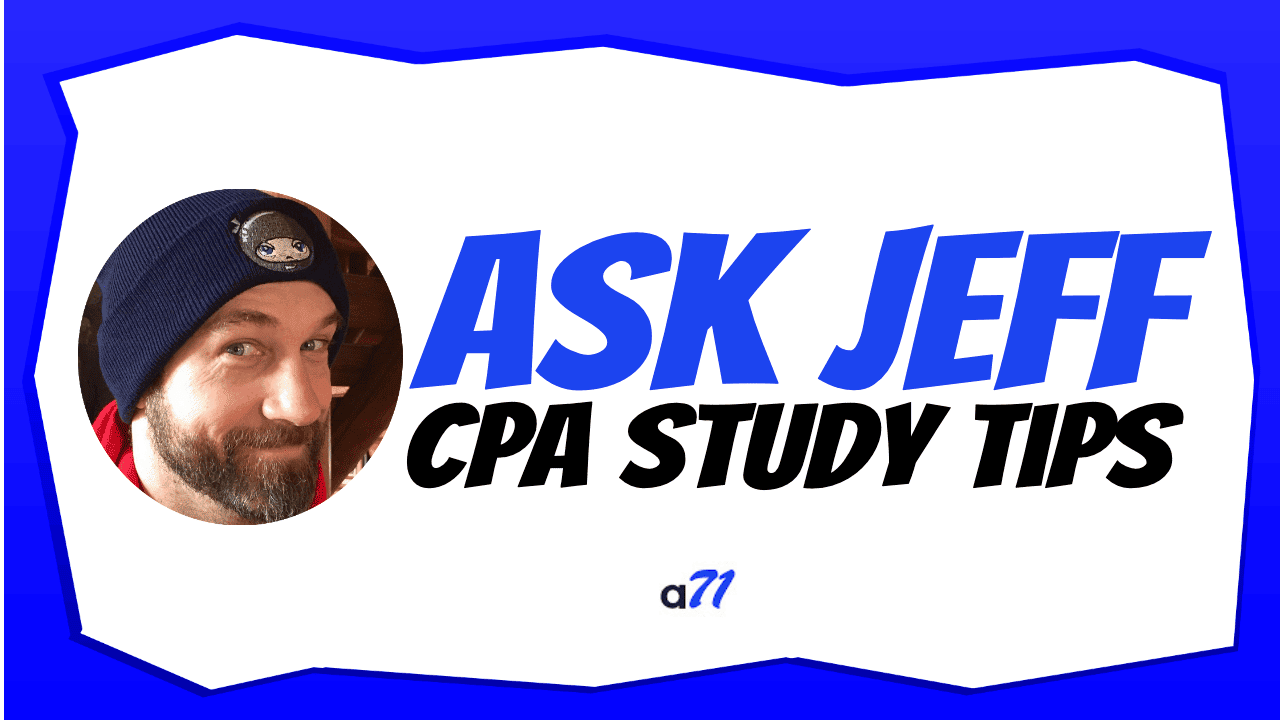
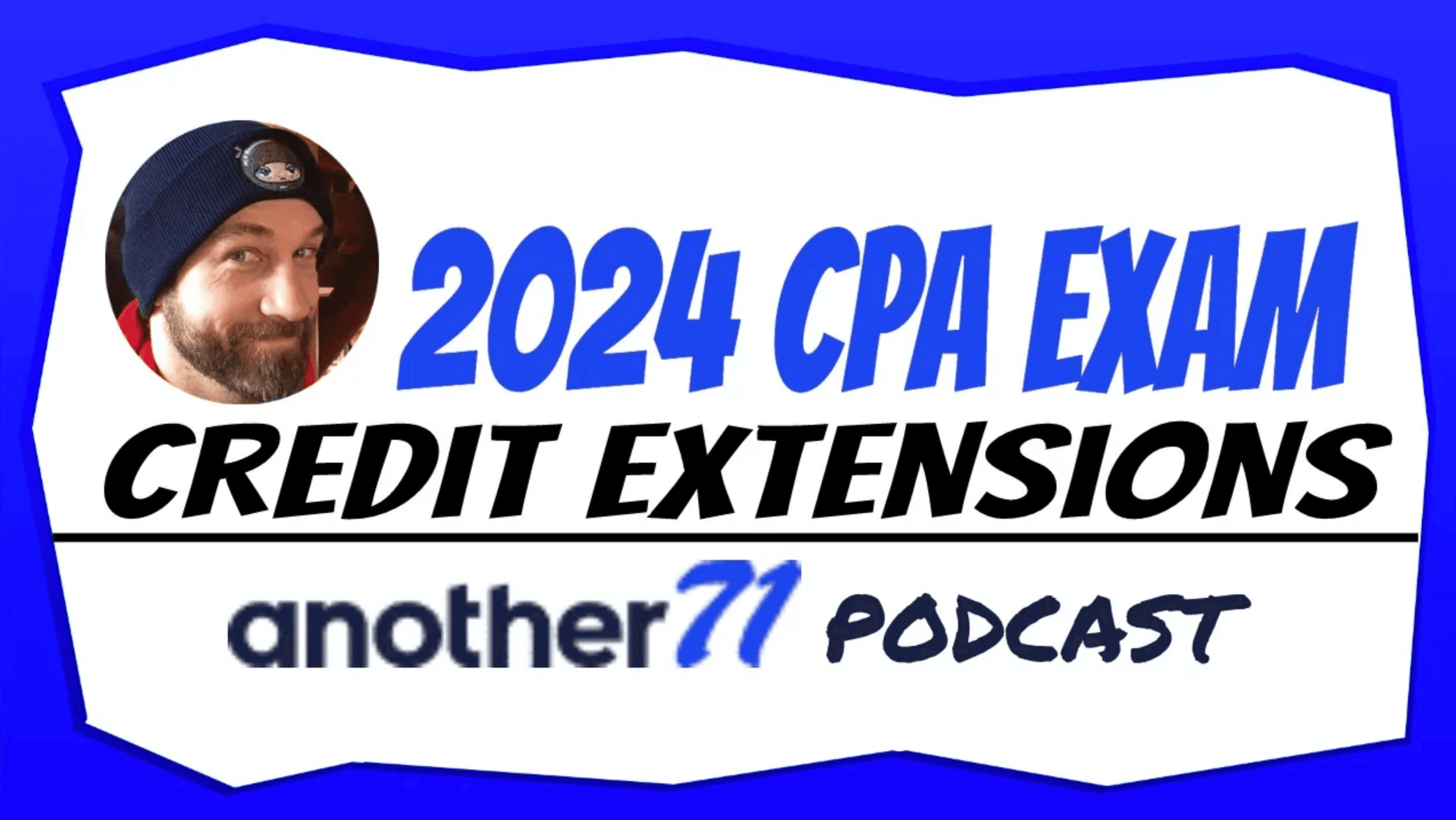
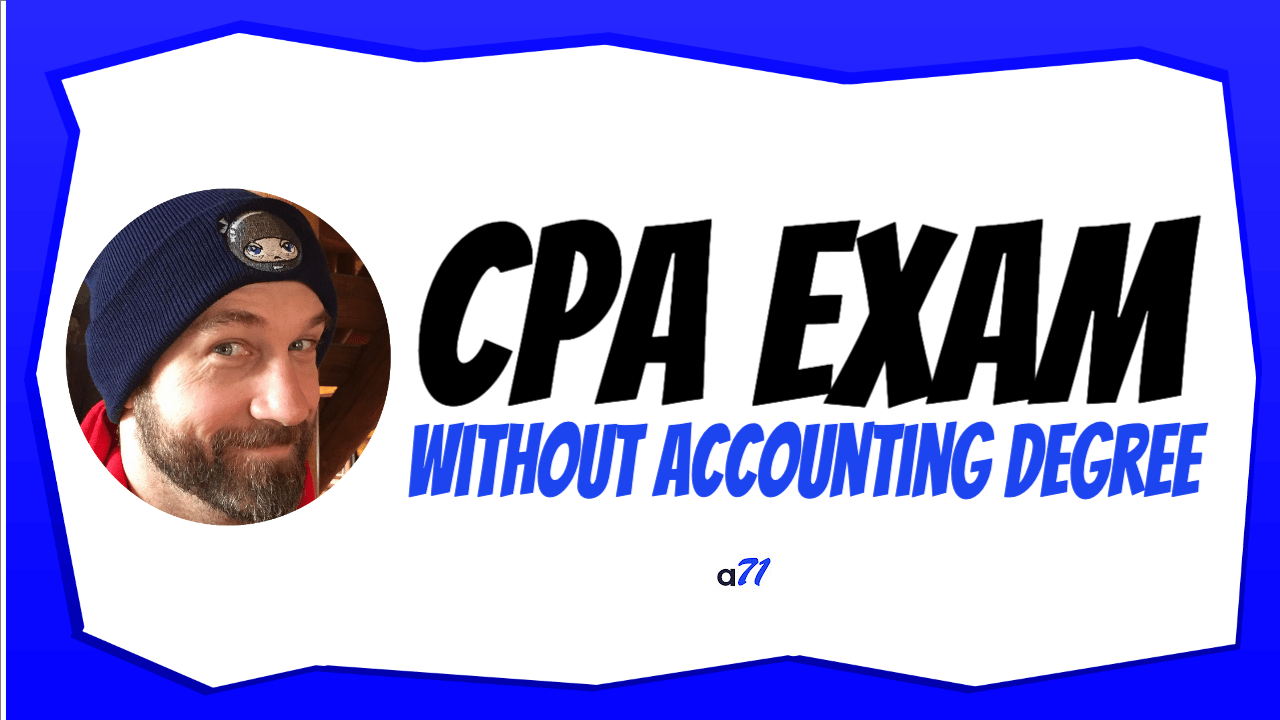
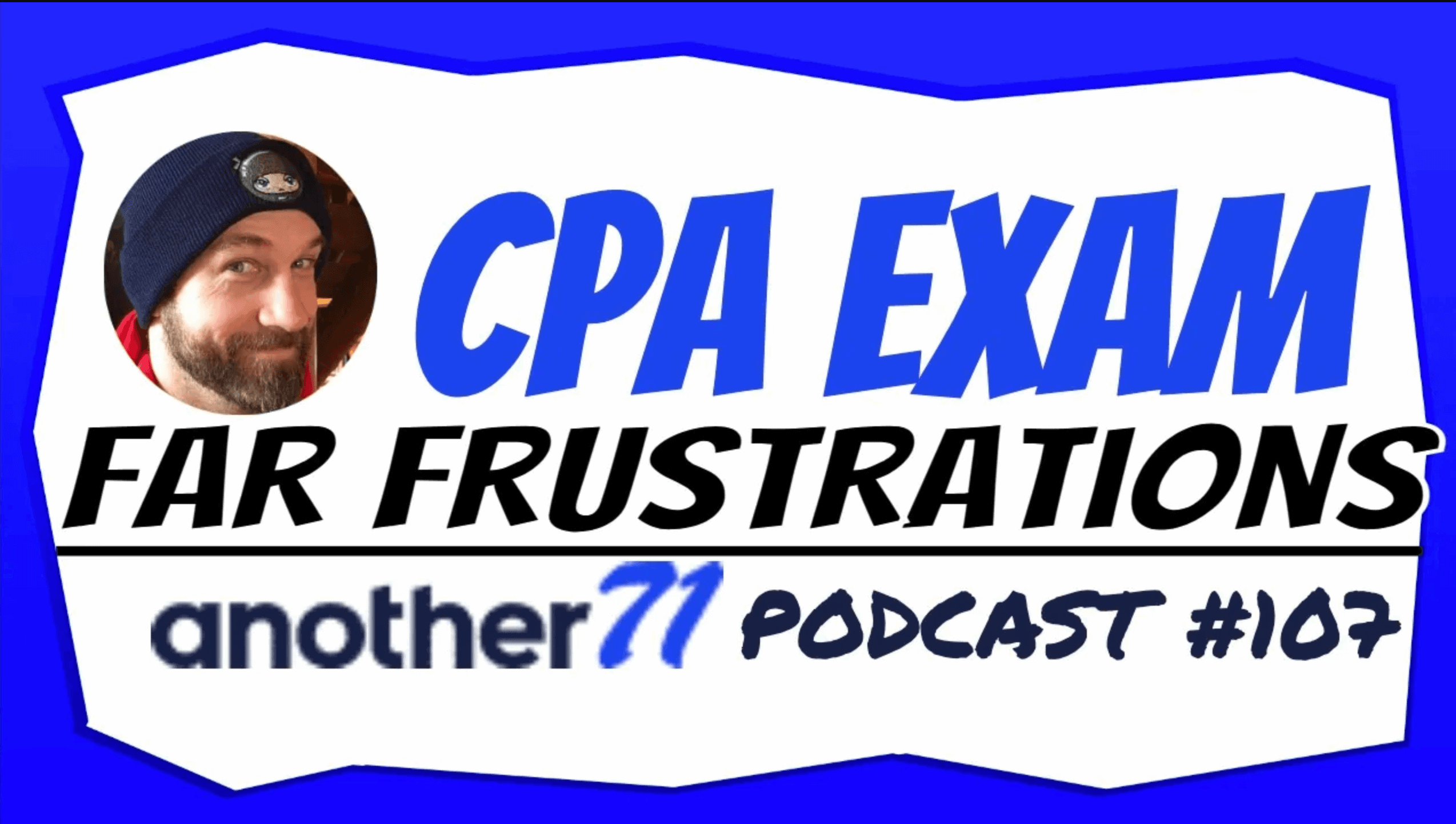

You don't need 150 hours to take the CPA exam. :) #ColoradoStyle
Hi Brian, the majority of states do require 150 to sit for the Exam. True, CO is one of the few that don't.
Agreed -- posting this for candidates for an FYI rather than a point of fact for Another71 -- I know you are well aware of the story. I just think it is important for candidates to know that even if you don't live in a state that doesn't require 150 (Colorado) you can still sit for the exam in any state that you live in under the Colorado requirements. I know Another71 has wrote a post on this before but I think few people know about this advantage. I live in Kansas and did not have 150 hours when I passed the CPA exam. It doesn't matter where you live or work, you don't need 150 hours to sit for the CPA exam. From New York to California if you meet the requirements of Colorado you can roll up to a Prometric in any state/Guam/Puerto Rico and sit for the exam. Licensing is another matter and if you care about where your license is issued or the state that issues your certificate....then the 150 hours actually comes into play. I just want everyone to know before you go blow $$$ on night classes to get 150 hours, you really don't need them if your only objective is to pass the CPA exam. If you are not in public accounting it really doesn't matter what state issues your license and certificate. At the end of day it is the same test for everybody, 150 hours or not.